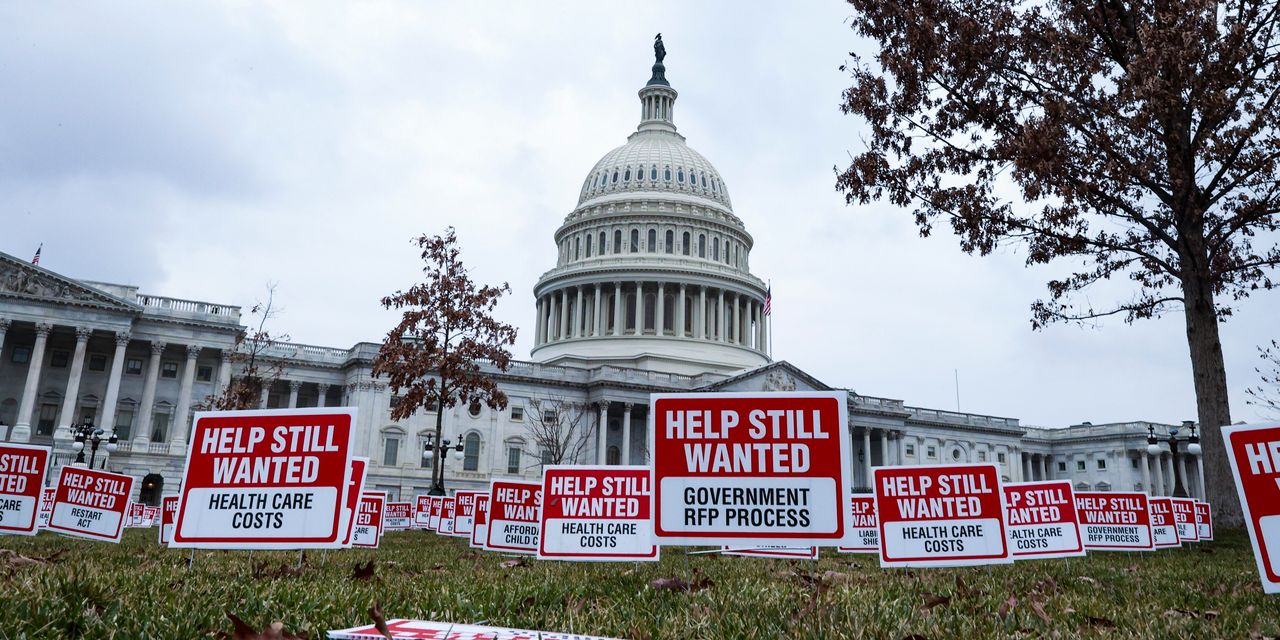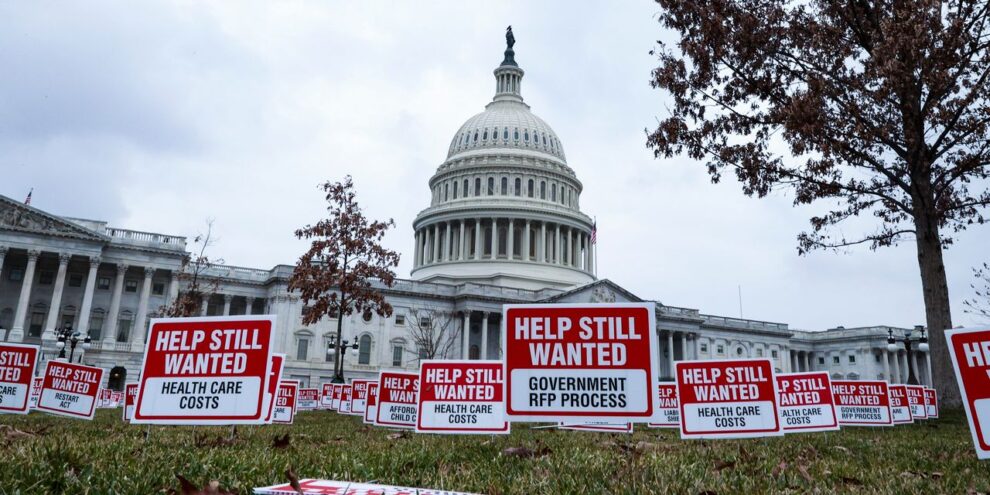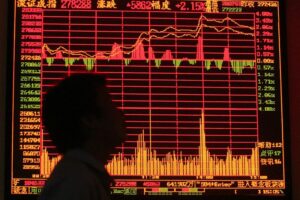
U.S. stock indexes notched their best weekly gain since the November elections Friday, even though the latest update on employment showed a disappointing jobs gain in January, suggesting that recovery in the labor market is stalling.
How did stock benchmarks perform?
- The Dow Jones Industrial Average DJIA, +0.30% rose 92.38 points, or 0.3%, to close at 31,148.24, just shy of its Jan. 20 closing record at 31,188.38.
- The S&P 500 index SPX, +0.39% gained 15.09 points, or 0.4%, to settle at 3,886.83, a fresh record, its seventh in the year to date.
- The Nasdaq Composite Index COMP, +0.57% climbed 78.55 points to reach 13,856.30, a gain of 0.6%, also a new high – its eighth of the year.
On Thursday, the S&P 500 notched its sixth record close of 2021, while the Nasdaq registered its seventh record of the year so far, and the Dow finished just 0.4% off its all-time closing high. The small-capitalization focused Russell 2000 RUT, +1.40% climbed 1.8%, setting a record.
For the week, the Russell gained 7.6%, the Nasdaq added 6%, the S&P 500 index advanced 4.7%, and the Dow ended 3.9% higher.
What drove the market?
The U.S. Labor Department’s employment report showed 49,000 jobs were added in January, while the unemployment rate fell to 6.3% from 6.7%.
The results affirm the view that the recovery in the jobs market is stalling out amid the COVID-19 pandemic that has slammed the U.S. economy. Some 10 million jobs that vanished in the early stages of the pandemic still haven’t returned.
“By looking at the US [nonfarm payrolls] data, it is clear that massive strength that we have seen previously in a lot of areas in no longer there,” wrote Naeem Aslam, chief market analyst at AvaTrade. “This means that the US lawmakers can push really hard for the next second stimulus package,” he wrote after the labor data was released.
The January report follows a reading from December that showed that 140,000 jobs were lost, marking the first monthly decline in employment figures in about eight months when the COVID-19 pandemic first walloped the country.
The January report comes as many states reimposed business restrictions at the end of last year to combat the pandemic and restaurants and hotels had to lay off workers, some for the second or third time.
The state of employment is likely to be even worse than the labor report for last month reflects, economists say. Several million people who dropped out of the labor force, bringing the unemployment rate lower, did so because they couldn’t find work and thus aren’t counted in the main unemployment rate.
Still, investors appeared upbeat on the basis of healthy earnings from American corporations in the second-busiest week of fourth quarter reporting season results, along with prospects for Congress passing President Joe Biden’s $1.9 trillion coronavirus relief package, using a special reconciliation procedure.
The Senate early Friday approved a budget resolution, 51-to-50, that would allow for a fast tracking of the $1.9 trillion coronavirus relief plan.
One benefit of the softer employment data is that it could enhance the prospects for further fiscal spending under Biden.
“The biggest risk with the nonfarm payroll report was a strong rebound in hiring that could diminish the prospects of future fiscal stimulus,” wrote Edward Moya, senior market analyst at Oanda, in a research note.
He notes that the slowness of the current recovery remains a key concern, as well as a sluggish bounceback that would have lingering impacts on parts of the economy.
“Economic scarring is happening as the number of long-term unemployed continues to stay at around the 4 million level,” Moya wrote.
See: Biden says he could deliver $1.9 trillion aid package without Republican support
Fears of a market correction that took hold last week, inspired by a Reddit-led group of individual investors, has given way to fresh gains for stocks. The rally for the major benchmarks now puts them on track for their best weekly gains in about three months, FactSet data show.
“US markets extended their rebound for the fourth day in a row yesterday, as the recent fallout from last week’s Reddit inspired sell-off faded further,” wrote Mark Hewson, chief market analyst at CMC Markets, in a daily research note.
“Improvements in US economic data, along with the prospect of further fiscal stimulus, have helped underpin this week’s recovery.”
Meanwhile, Treasury Secretary Janet Yellen said regulators would ensure investor protection, following a months long social-media campaign by individual investors to drive up the value of heavily shorted stocks like GameStop Inc. GME, +19.20%.
Popular trading app Robinhood Markets has removed the last of its trading limits on shares of GameStop and AMC Entertainment Holdings AMC, -3.67%, among others. Market volatility associated with the reaction to the retail trading frenzy has significantly died down.
On the public-health front, Johnson & Johnson JNJ, +1.52% applied for on an emergency use authorization of its single-shot COVID vaccine, which could result in Americans getting shots as early as March.
COVID-19 hospitalizations continued to fall, to 88,668 on Thursday, the lowest total since Nov. 24, according to the COVID Tracking Project. However, the number of deaths in the U.S. resulting from the coronavirus that causes COVID-19 spiked above 5,000 for the first time on Thursday, snapping a declining trend.
In other economic reports, the U.S. international trade deficit fell in December, but the nation’s trade gap still climbed in 2020 to the highest level in 12 years due to the coronavirus pandemic. The trade gap slid 3.5% to $66.6 billion in December from $69 billion in November, the government said Friday.
See also: The rotation is for real, January fund flows confirm
Which stocks were in focus?
- Shares of Regeneron Pharmaceuticals Inc. REGN, +0.03% ticked up fractionally on Friday after the company said its COVID-19 antibody cocktail treatment generated $145.5 million in sales in the fourth quarter of 2020 as part of its earnings.
- A Food and Drug Administration advisory committee will meet Feb. 26 for an all-day meeting to discuss Johnson & Johnson‘s JNJ COVID-19 vaccine candidate. Shares of J&J gained 1.5%.
- Estee Lauder Companies EL, +7.81% reported a fiscal second-quarter profit that was well above expectations, as revenue also rose above forecasts, but provided a downbeat outlook for the current quarter as a resurgence in COVID-19 has led to renewed government restrictions. Shares rose 7.8%.
- Shares of Noble Midstream L.P. NBLX shot up 6.7% Friday, after Chevron Corp CVX, +0.29%. offered to buy the operator of midstream infrastructure assets, which is already majority owned by Chevron, in a deal that values Noble Midstream at about $1.13 billion. Chevron shares added 0.3% Friday.
- China’s Luckin Coffee filed for Chapter 15 bankruptcy in New York. All of its coffee chains will remain open, Luckin said in a statement.
- Shares of Aurora Mobile Ltd. JG, +25.13% surged 37% Friday, after the China-based mobile developer service provider announced a partnership agreement with Kuaishou Technology, the TikTok rival backed by China-based technology giant Tencent Holdings Ltd. TCEHY, to improve advertising monetization efficiency.
- Ford Motor F, +1.23% reported an unexpected fourth-quarter profit. Shares rose 1.2%.
- News Corp. NWS, +6.12% said late Thursday that its fiscal second-quarter was the most profitable quarter since the company’s reorganization seven-plus years ago, even as quarterly revenue declined by 3% from the year-ago quarter. Shares jumped more than 6%.
- Peloton Interactive Inc. PTON, -5.86% notched its first-ever quarter with revenue above $1 billion, but was weighed delays in shipping of its products. Shares closed nearly 6% lower.
How did other assets fare?
- The yield on the 10-year Treasury note TMUBMUSD10Y rose 2.5 basis points to about 1.172%, from 1.090% last Friday. Yields and bond prices move in opposite directions.
- The ICE U.S. Dollar Index, DXY, a measure of the currency against a basket of six major rivals, was down 0.6%, after being up by nearly 0.5% so far this week.
- Gold futures GCJ21 rose $21.80, or 1.2%, to settle at $1,813 an ounce.
- Oil futures rose, with the U.S. benchmark CL.1 CLH21, +1.49% gaining 62 cents, or 1.1%, to settle at $56.85 a barrel on the New York Mercantile Exchange.
- The Stoxx 600 Europe index SXXP closed unchanged, while London’s FTSE 100 UKX finished 0.2% lower.
- In Asian trade on Friday, the Shanghai Composite SHCOMP ended 0.2% lower, Hong Kong’s Hang Seng Index HSI gained 0.6% and Japan’s Nikkei 225 NIK rose1.5%.





